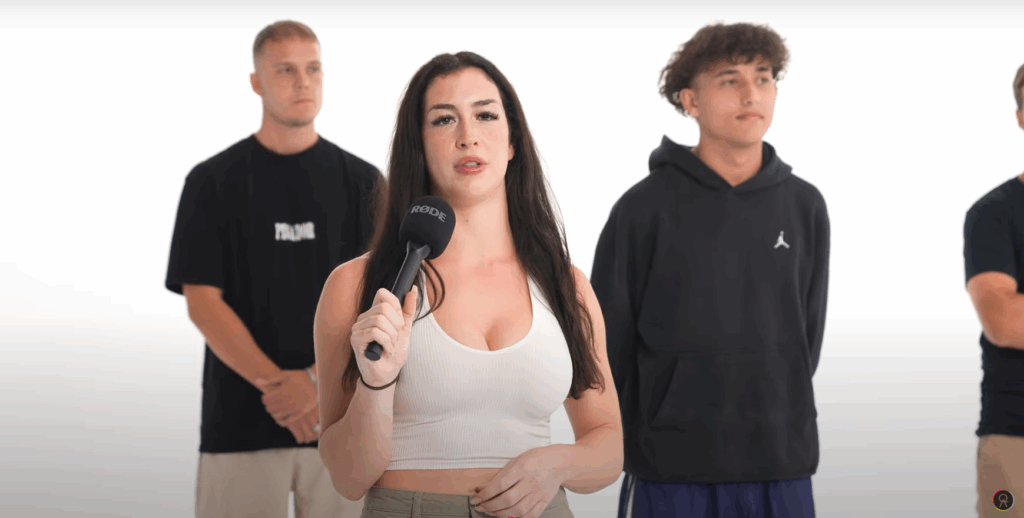
🧠 Who Gets to Be an Influencer in 2025?
The rise of influencer culture in Australia has been slower, but in some ways more authentic, than its American or Asian counterparts. The “hot girl with a skincare shelfie” or the “gym bro with a discount code” still exists, but what makes Quasar’s casting different is this:
None of the participants were invited through agencies.
Every single one responded to open casting calls across Australia and New Zealand—from Reddit, TikTok, or an Instagram story shared in a friend group. No blue ticks. No handlers. Just raw access to the people shaping public perception on our screens.
This casting model is intentional.
“We don’t want avatars. We want contradictions,” Dami says. “You’ll never see a Quasar episode where everyone plays to the camera. That defeats the point.”
In the Do All Influencers Think the Same? episode, this philosophy pays off. You get:
- A trans TikTok creator who talks about monetizing activism.
- A 27-year-old ex-reality TV contestant who now does daily affirmations for her 50K followers.
- A 19-year-old beauty creator who admits, “I sometimes use Canva to fake event invites.”
This isn’t a parody. This is the reality of Gen Z fame in 2025—performative, precarious, but deeply self-aware.
🎥 Why Spectrum Games Work (And Why They Hurt)
The brilliance of the game debat format, especially in the Quasar ecosystem, is that it turns positions into stories.
When someone moves to the “Strongly Disagree” side on a prompt like “I’m proud of my content,” it invites a deeper reckoning.
In the influencer edition, one woman shared:
“I’m tired of selling positivity. I’m sad most days. But sad doesn’t convert.”
That line alone drove thousands of likes and sparked entire reaction videos.
Here’s what makes Quasar Central’s take on the Spectrum format unique:
- No Narrator: The cast is the narrative. The tension lives in the silence between them.
- No Prepped Talking Points: Participants see prompts for the first time on set.
- Cinematic Editing: Music, pacing, and silence are treated like characters in the story.
Quasar doesn’t sanitize conflict. It lets contradiction breathe.
📈 Performance Metrics: More Than Just Views
This episode didn’t just generate buzz—it lit up the algorithm.
- YouTube Views (First 7 Days): 28,000+
- TikTok Clips Shared: 35+, including one trending clip captioned “Faking it is the new normal.”
- Average Watch Time: 7.2 minutes — well above the channel’s average
- Top Comment: “Finally, influencers being real. This is what Jubilee wishes it was.”
That last comment gets to the heart of Quasar’s model: take Jubilee’s thought experiment and run it through the cultural lens of Gen Z APAC. You don’t get shiny resolution. You get friction—and that’s what builds trust.
🪞 The Mirror Is the Medium: What Influencers Reveal About the Rest of Us
This isn’t just a niche episode. This is thematic architecture for what Quasar Central is building:
- 🌀 Fame as Performance
Influencers don’t just perform for the audience—they perform to stay employed. The episode cracked open the emotional tax of always being “on.” - 🌐 Aussie-Specific Media Culture
Australia’s influencer landscape isn’t as aspirational as America’s, nor as commerce-focused as Asia’s. It’s awkward, a bit irreverent, and grounded in “mate culture.” This shows up in every Quasar episode—participants are more likely to roast each other than posture for clout. - 💬 Relatability as Currency
What’s replacing traditional “celebrity” in the influencer economy? Vulnerability. And this episode weaponized it—in the best way possible.
🚀 The Future of Format: Where Quasar Is Taking This Next
Do All Influencers Think the Same? is just one node in a growing network of narrative experiments.
Coming next:
- “Do All OnlyFans Creators Think the Same?” (Gold Coast Edition)
- “Do All Ex-Mormons Think the Same?” (NZ Shoot)
- “Do All Aussie Gamers Think the Same?” (Melbourne Edition, co-produced with Twitch streamers)
And these aren’t just videos. They’re format IPs that Quasar is building to scale—across APAC, then globally.
Dami’s vision is clear:
“Every city we shoot in is another layer of the story. Eventually, we’ll be doing ‘Do All Nigerians Think the Same?’ in Lagos. That’s the scale we’re playing for.”
🧵 Final Thought: What This Episode Really Showed Us
In a media age obsessed with likes, filters, and follower counts, this episode asked the question none of the platforms want to confront:
What happens when influencers stop pretending?
What happens is Quasar Central.
The platform isn’t just documenting media culture. It’s rewriting the rules—one unscripted debate, one broken persona, one brave confession at a time.
And if you’re still not watching? You’re missing the realest thing happening in media right now.
🎥 Watch the full episode here: Quasar Central YouTube
